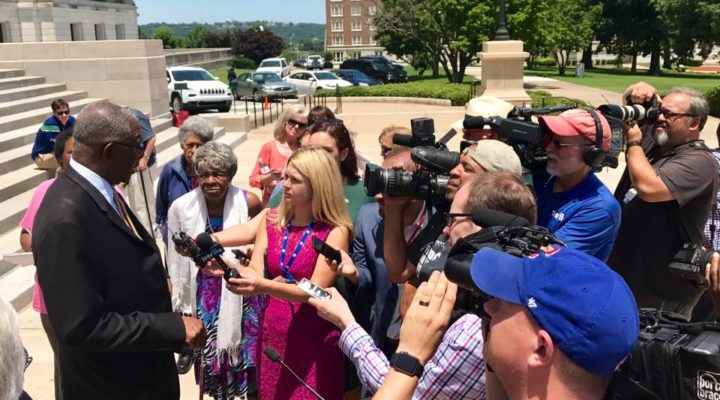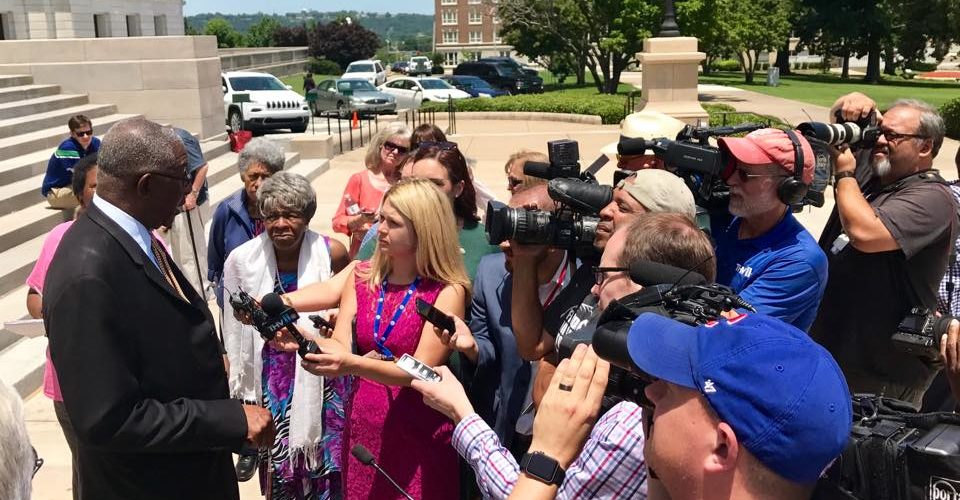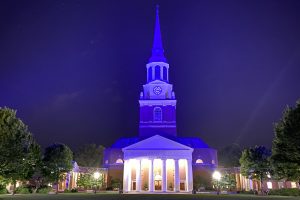An Arkansas judge who also serves as a Baptist pastor told reporters last Friday his controversial participation in a Good Friday death penalty protest is protected by a state law passed in 2015 to bolster religious freedom after the U.S. Supreme Court legalized same-sex marriage.
Pulaski County Circuit Court Judge Wendell Griffen — under investigation about whether his personal opposition to capital punishment compromises his ability to rule impartially in death penalty cases — accused critics of violating a state law mirroring the federal Religious Freedom Restoration Act signed into law by President Clinton in 1993, according to the Arkansas Democrat-Gazette.
Senate Bill 975 prevents the state government from substantially burdening a person’s religious exercise unless it furthers a compelling government interest and does so by the least restrictive means. Gov. Asa Hutchison signed the measure into law after rejecting an earlier version that critics said would have allowed businesses to refuse services to homosexuals.
It is one of a number of state RFRAs passed amid concerns about the impact of the landmark 2015 ruling in Obergefell v. Hodges — which established marriage as a civil right — on individuals with sincerely held religious beliefs that marriage is only between a man and woman. The most famous, an Indiana law signed by then-Gov. Mike Pence, drew widespread criticism and boycott threats from groups including the NCAA and was eventually revised to add LGBT protections.

CBF leaders, including executive coordinator Suzii Paynter (second from right), joined Wendell Griffin on the steps of the Arkansas State House (Facebook photo)
Griffen, pastor of New Millennium Church in Little Rock, Ark., said the Arkansas RFRA has already been violated in the strict scrutiny he has received since joining church members at a previously scheduled prayer vigil outside the governor’s mansion after granting a temporary restraining order to a drug manufacturer claiming ownership of one of the products about to be used in a series of executions in the 10 days following Easter.
“I do not misunderstand what freedom means,” Griffen told local media after a rally in his support featuring leaders of the Cooperative Baptist Fellowship.
“I am not a slave,” said Griffen, who is black. “I’m a free man, and I will behave as a free preacher and a free judge as long as I am me.”
Griffen reportedly did not speak at the rally, organized by religious and civil rights leaders, supporting his right to express his religious beliefs while serving as an elected judge.
“Those who serve in government are not disqualified from having religious beliefs and exercising their religious beliefs in ways that are protected by law,” said Suzii Paynter, executive coordinator of the Cooperative Baptist Fellowship.
“Conviction of conscience and the rule of law are not enemies,” added Preston Clegg, pastor of Second Baptist Church in Little Rock. “One can be both convictional about the issues and impartial about how the law pertains to any person standing in a courtroom.”
The Arkansas Supreme Court has barred Griffen from hearing any cases relating to the death penalty or the lethal injection protocol. He is under investigation by the state Judicial Discipline and Disability Commission. Some lawmakers have called for his impeachment.
Ray Higgins, executive coordinator of CBF of Arkansas, said the judge stands in the tradition of past Baptist ministers like Will Campbell and Martin Luther King Jr., who in their day were controversial and misunderstood but whose truths and example “stand the test of time.”
Previous stories:
Pastor/judge threatened with impeachment says his critics ignore the Constitution
Judge disputes claims that his death penalty protest violated judicial impartiality








































































